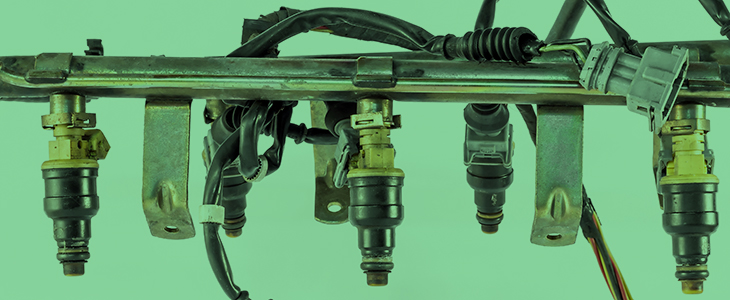
Fuel Filter 101 – Symptoms, Replacement and Cost
While it’s much cleaner today than ever before, the fuel in your vehicle’s gas tank still contains particles, sediment, and contaminants that can clog the fuel filter. The buildup of contaminants restricts the flow of fuel, which can subsequently cause engine problems. Fuel filters serve a critical function within your car’s engine fuel system and problems are often misdiagnosed because they mimic other common problems. The fuel filter’s job is to trap impurities in the filter media and prevent them from getting farther into the fuel system – ultimately affecting engine performance.
Your vehicle’s fuel filter is often a small part that performs a big job. As the fuel filter does its job of collecting particles, the filter media starts to become blocked. Even the smallest amounts of debris can result in costly damage, poor gas mileage, and decreased performance. The debris reduces the flow of fuel to the pump and amount of fuel that reaches the injectors. If the filter becomes too clogged, the reduced fuel volume will decrease power and may cause the engine to hesitate, misfire or stall.
Symptoms of a Clogged Fuel Filter
Knowing the symptoms of a failing fuel filter will help prevent engine damage and the need for costly repairs. Here are a few signs that it’s time to have your fuel filter checked.
- Decreased Performance: This symptom may be difficult to identify right away because when you step on the gas pedal or drive at higher speeds, the performance will probably seem normal. The performance issues become noticeable at lower speeds when the fuel pressure is lower. Signs to look for include rough idling, hesitation or cutting out when accelerating.
- Hesitation: A delayed response when you accelerate, or engine staggering as you try to increase your speed, could be a sign of a dirty fuel filter.
- Rough Idle: With less fuel flowing through a partially clogged filter, the vehicle is likely to run rough when idling. At this point, it’s very important to have your fuel filter checked, as the problem is likely to persist and the car could begin to stall or not start at all.
- Problems Starting: A combustion engine requires a certain amount of fuel to start and continue to run. A clogged fuel filter could prevent enough fuel from making it into the fuel system – preventing the engine from starting up easily, or worse, preventing it from starting at all.
Fuel Filter Replacement Interval Recommendations
Manufacturer recommendations for fuel filter replacement vary wildly! For example, on many late model vehicles, Volkswagen recommends changing the fuel filter every 20,000 miles. Then there’s Ford, who recommends changing fuel filters for some of their vehicles every 12,000 miles and Volkswagen who recommends a change every 100,000 miles. The difference from one manufacturer recommendation to the next usually is not one filter performing better than another. Some filters are just easier to access than others and for those situations, it’s good preventative maintenance to change the filter more often. Always refer to your owner’s manual to find the replacement interval guideline for your vehicle.
The Fuel Filter Should be Replaced by a Trained Professional Installer
Your installer will recommend replacement during routine maintenance based on your vehicle’s mileage and its preventative maintenance schedule. There are a few reasons why a professional installer is the right choice for fuel filter replacement. First, they have the experience and information necessary to quickly identify a filter that should be replaced. As we’ve already mentioned, they have your vehicle’s preventative maintenance schedule at their fingertips. This fact, combined with what you’ve told them about recent performance, helps the installer determine if it’s something that should be considered. Second, they have the proper equipment and a variety of tools necessary to safely remove and replace all types of fuel filters. Third, as we’ve said before, many fuel filters are not easy to access and replacement should not be attempted by anyone but a professional installer.
Fuel Filter Replacement Cost
What you can expect to pay a professional to replace a fuel filter depends on the type of car you drive and the labor rate of the auto service shop. However, the typical price range for parts and service is between $100 and $200. This is a relatively low price to pay for maintaining your vehicle’s engine health and ensuring optimal performance.
If you are experiencing any of the signs of a clogged fuel filter that we’ve mentioned here, it would be smart to contact your service professional right away.
Share this entry